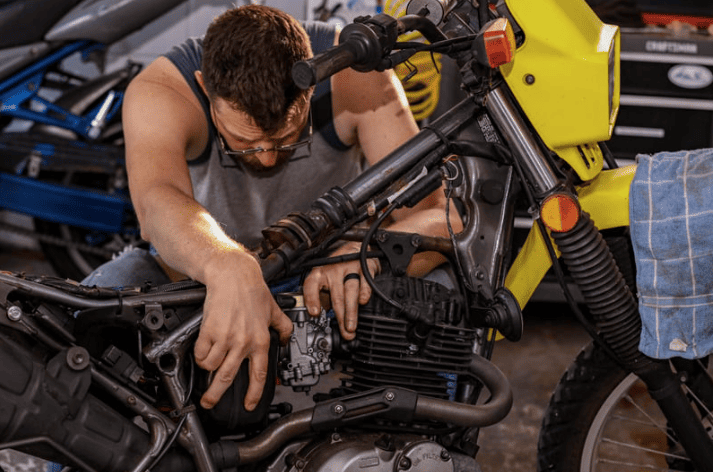
Understanding the most common motorcycle collision scenarios helps you identify what happened, anticipate potential injuries, and consider how liability may be assigned. In Florida, these crashes frequently involve another vehicle making a left turn, head-on impacts, or hazards on the roadway. According to the most recent available data, about 65 percent of motorcyclist fatalities occur in multi-vehicle collisions, while roughly 35 percent involve only the motorcycle.
Recognizing these motorcycle accident types allows you to see how liability might develop, what evidence can be valuable, and how risk factors such as speed or visibility often play a role.
Common Motorcycle Collision Types
Below are the most frequent types of motorcycle collisions.
Left-Turn Crashes
In left-turn accidents, another vehicle turns across your path at an intersection and fails to see you. These collisions often occur because the driver misjudges the speed or distance of your motorcycle. You can suffer serious injuries from these sudden collisions.
Head-On Collisions
Head-on collisions happen when a vehicle drifts into your lane or you collide with theirs, resulting in a high-impact crash. These crashes cause some of the most severe injuries due to the combined force. You may face long-term consequences, such as spinal damage or severe fractures.
Rear-End Collisions
A vehicle hits you from behind in these crashes, often at stoplights or in traffic. Drivers can underestimate their stopping ability or get distracted. You may sustain neck and back injuries, and you need evidence like dashcam footage or witness statements to show fault.
Single-Vehicle Accidents (Fixed-Object Collisions)
Sometimes a rider may lose control and strike a fixed object like a tree, guardrail, or utility pole. Over-braking, slippery surfaces, or road debris often cause these crashes. These accidents typically stem from rider error or roadway conditions, and they show why road maintenance and hazard signage matter.
Lowside and Highside Falls
These crash types describe loss-of-control incidents. In a lowside, your bike slides out and falls on its inner side, often due to too much braking or cornering on slippery surfaces. In a highside, you violently flip over the outer side when the rear wheel suddenly regains traction after slipping.
Each motorcycle collision type highlights the dangers riders face on Florida roads. Recognizing these patterns helps you connect the accident circumstances to liability and take informed steps toward recovery.
Key Risk Factors in Motorcycle Collisions
Several key factors commonly contribute to motorcycle crashes and shape the outcomes that follow. These risks range from speeding and distracted driving to dangerous road conditions and impaired drivers. Understanding how they interact not only explains why collisions occur but also highlights the evidence needed to prove liability.
Speeding
Higher speeds reduce your ability to react and increase the impact force during a collision. Even small increases above posted limits can make the difference between a survivable crash and a fatal one. Speed-related motorcycle accidents are also more likely to involve severe injuries such as traumatic brain injuries or spinal fractures.
Low Visibility
Many collisions occur when drivers claim they did not see the motorcyclist. Poor lighting, heavy traffic, or blind spots can make you harder to detect, especially in left-turn crashes at intersections. When drivers fail to yield because they overlook your presence, liability often centers on their duty to keep a proper lookout.
Road Hazards
Uneven pavement, potholes, gravel, or unexpected debris can cause you to lose control quickly. These hazards often lead to lowside or highside crashes, which produce unique injury patterns depending on how the motorcycle falls. You may also have a potential claim against the responsible property owner or government entity.
Driver Distraction
Texting, adjusting controls, or other in-car distractions can cause a driver to miss a motorcycle. When distraction plays a role, evidence such as cell phone records or vehicle data can help show negligence. Demonstrating that the driver was not paying attention can be vital in proving liability.
Alcohol or Drug Use
Impaired drivers pose an exceptionally high risk to motorcyclists because of slower reaction times and poor judgment. If an impaired driver causes your crash, criminal charges may overlap with your civil claim for damages. This factor often clarifies liability, though you need strong evidence to support your case.
Each of these factors contributes to the likelihood and severity of motorcycle crashes, shaping outcomes and potential liability.
What to Do After a Motorcycle Collision
You can preserve your ability to pursue compensation by acting promptly and thoroughly.
Gathering Evidence
You should collect photos of the scene, vehicle damage, and injuries. Obtain witness names, traffic signal information, skid mark details, and nearby surveillance camera footage. If your crash involves another vehicle, you need documentation showing how the other vehicle moved, signaled, or failed to yield.
Seeking Medical Attention Early
You want treatment records that connect your injuries directly to the crash. Maintaining detailed records supports your claim, whether you face soft-tissue injuries from rear-end impacts or fractures from high-impact crashes. When you get examined quickly, you protect your long-term health and legal rights.
Consulting Legal Help Fast
Different collision types raise different liability questions. For instance, a left-turn crash may involve negligence in yielding, and you need someone who understands how to interpret roadway duty and traffic laws. Acting without delay keeps evidence fresh and ensures you stay within Florida’s strict filing deadlines.
Each of these types of motorcycle accidents carries its own risks, evidence needs, and potential injuries. By understanding these scenarios and the factors that contribute to them, you place yourself in a stronger position to pursue fair compensation.
Speak with a Tampa Motorcycle Accident Lawyer Today
Every motorcycle accident has its own causes, injuries, and legal challenges. Whether your crash involved a distracted driver, a dangerous road condition, or a negligent motorist making a left turn, you deserve a lawyer who knows how to hold the right parties accountable. At Maranatha Law, founder Tim Maranatha personally oversees each case, bringing more than 30 years of experience to the table. We fight strategically to make sure riders and their families receive full and fair compensation.
Call today for a free consultation and let us start building your case while the evidence is fresh.



